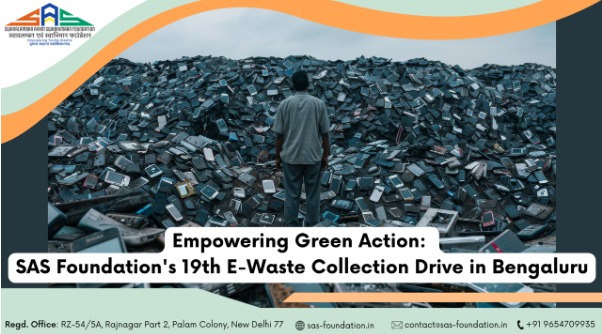From Waste to Worth: How NGOs Are Powering the E-Waste Recycling Movement
Did you know the world generates over 53.6 million metric tons of electronic waste (e-waste) each year? 🌍 That’s roughly equivalent to the weight of 350 cruise ships! And the numbers are only expected to rise as technology becomes increasingly central to our daily lives.
While e-waste includes everything from old smartphones and laptops to defunct TVs and chargers, what often goes unnoticed is the danger it poses when not handled properly. Discarded electronics contain toxic substances like lead, mercury, cadmium, and brominated flame retardants—hazardous materials that can seep into our soil, water, and air, leading to serious environmental and health consequences.
But there’s hope. In this rising tide of e-waste, NGOs (Non-Governmental Organizations) are emerging as powerful agents of change, stepping up to bridge awareness, infrastructure, and action. These grassroots champions are educating communities, enabling safe recycling, creating green jobs, and even shaping policies to build a circular economy.
Let’s dive into the incredible work NGOs are doing—and how you can be part of this transformative movement.
🌱 The E-Waste Challenge: A Growing Global Crisis
The rapid turnover of electronic devices—fueled by marketing trends, product upgrades, and consumer demand—has led to a mountain of waste. Unfortunately, only 17.4% of global e-waste is formally collected and recycled. The rest often ends up in landfills, incinerators, or informal recycling sectors with no safety standards, causing severe harm to waste workers and the environment.
While governments and tech companies have a role to play, the on-ground transformation is often led by NGOs—organizations that work at the grassroots level to educate, mobilize, and empower.
💪 The Role of NGOs in E-Waste Management
- Raising Awareness
NGOs are instrumental in educating the public about what e-waste is, why it’s dangerous, and how to dispose of it properly. Many people are unaware that tossing a phone into the regular trash is illegal or that e-waste can contain recoverable precious metals like gold and silver.
Through school programs, webinars, street plays, digital campaigns, and community workshops, NGOs simplify the science and urgency behind responsible recycling, especially in rural and underserved areas.
Example: SAS Foundation has been actively organizing awareness drives and webinars to educate youth about the environmental hazards of e-waste and promote sustainable behavior.
- Organizing E-Waste Collection Drives
One of the most direct ways NGOs contribute is by setting up collection points and e-waste drives. These drives allow citizens to safely dispose of their electronics while ensuring proper handover to authorized recycling facilities.
These efforts help reduce the burden on landfills, discourage informal and unsafe recycling practices, and create a trustworthy channel between consumers and recyclers.
Impact Highlight: SAS Foundation’s e-waste collection campaigns, in collaboration with Attero, have successfully collected over 1.39 tonnes of e-waste in a single year, engaging hundreds of citizens and inspiring collective climate action.
- Advocating for Better Policies
Many NGOs work hand-in-hand with policymakers to strengthen existing e-waste laws, demand Producer Responsibility (EPR), and improve infrastructure. They serve as watchdogs and collaborators, pushing for:
- Improved data transparency
- Stronger penalties for violations
- Incentives for eco-friendly recycling
- Integration of informal workers into formal supply chains
NGO voices are often critical in shaping environmental legislation and ensuring that the most vulnerable aren’t left behind in the push for sustainability.
- Empowering Through Green Jobs and Skills
E-waste recycling isn’t just about cleaning the planet—it’s about building livelihoods. NGOs train and upskill youth, women, and informal waste workers in:
- Safe dismantling of electronics
- Material segregation and sorting
- Repair and refurbishment
- Entrepreneurship in e-waste management
This not only creates jobs but also contributes to the circular economy—where waste is not wasted, but repurposed, reused, or recycled to generate value.
Through skill-building initiatives, NGOs help transform waste pickers into certified recyclers and entrepreneurs—creating dignified employment opportunities while ensuring environmental protection.
🔄 Driving the Circular Economy
By supporting reuse, repair, and recycling, NGOs promote the concept of a circular economy—an economic model where resources are used for as long as possible. This shift moves us away from the traditional “take-make-dispose” cycle and toward sustainable consumption.
Whether it’s refurbishing old laptops for schools or extracting valuable metals from discarded motherboards, NGO-led innovations are redefining the life cycle of electronics.
📢 How You Can Be Part of the Movement
Ready to make a difference? Here’s how you can get involved:
✅ Declutter Your Electronics: Collect unused phones, chargers, laptops, and drop them at verified NGO-run collection centers.
✅ Spread the Word: Share what you know. Help friends and family understand the importance of safe e-waste disposal.
✅ Support or Volunteer: Donate to NGO programs, volunteer at a collection drive, or attend awareness events in your community.
✅ Advocate for Change: Write to your local representatives asking for stronger waste management policies and support for recycling programs.
✅ Subscribe to Stay Updated: Get regular updates, tips, and news by subscribing to eco-focused newsletters and NGO channels.
🌟 Spotlight on SAS Foundation: Youth-Driven Sustainability
At Swavalamban Avam Swabhimaan Foundation (SAS Foundation), we believe in empowering youth through education, health, and sustainability. Our e-waste drives, awareness webinars, and collaborations with recycling partners like Attero have helped build informed communities and responsible habits.
Through every initiative, we aim to instill the idea that small actions can lead to big change.
📬 Don’t Miss Out – Stay Connected!
Want to know more about the amazing work NGOs are doing to promote sustainability and tackle the e-waste challenge head-on? 🌏
📩 Subscribe to our newsletter for exclusive stories, tips, event updates, and impact insights.
Together, let’s protect our planet, uplift communities, and build a greener, more sustainable future—one device at a time.
🔖 Keywords for this article:
e-waste recycling, NGO role in e-waste, environmental sustainability, electronic waste disposal, e-waste collection, green technology, NGO initiatives, sustainability awareness, waste management policies










